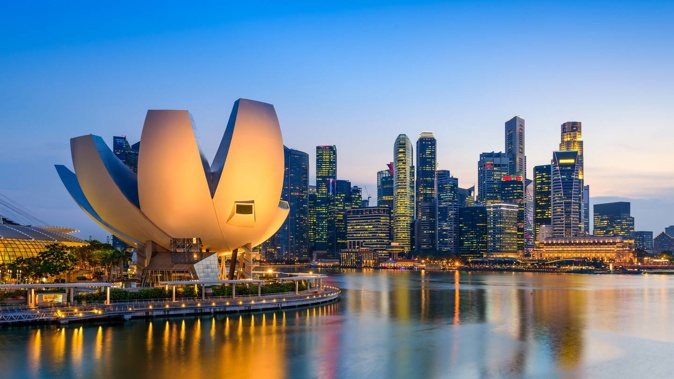
A country that has been one of the world's most successful at combating Covid-19 has announced it will soon fundamentally change how it manages the pandemic.
The city state of Singapore has stated Covid will be treated like other endemic diseases such as flu.
There will be no goals of zero transmission. Quarantine will be dumped for travellers and close contacts of cases will not have to isolate. It also plans to no longer announce daily case numbers.
But people may need to take tests to head to the shops or go to work.
Senior Singaporean ministers have said it is the "new normal" of "living with Covid".
"The bad news is that Covid-19 may never go away. The good news is that it is possible to live normally with it in our midst," wrote Singapore's Trade Minister Gan Kim Yong, Finance Minister Lawrence Wong and Health Minister Ong Ye Kung in an editorial in the Straits Times this week.
"It means that the virus will continue to mutate, and thereby survive in our community."
Singapore never got to zero
Like most countries, Singapore had an initial peak of cases last year, topping out at 600 a day in mid-April. Following a smaller wave in August, Covid-19 hasn't flared up since.
However, the nation of 5.7 million, slightly larger than Sydney, has had a steady undercurrent of 20 to 30 cases every day. The nation has recorded 35 deaths in total.
Singapore has strict border controls in place with most countries, including tests on arrival, hotel quarantine and stay-at-home orders.
But all that would be eventually done away with under the plan put out by ministers Ong, Gan and Wong, who make up Singapore's Covid-19 multi-ministry task force.
"Every year, many people catch the flu. The overwhelming majority recover without needing to be hospitalised, and with little or no medication. But a minority, especially the elderly and those with comorbidities, can get very ill, and some succumb.
"We can't eradicate it, but we can turn the pandemic into something much less threatening, like influenza or chickenpox, and get on with our lives," the trio said.
Vaccination first, then reduce restrictions
Vaccination is key. The road map out of the current measures can't begin until more people have been vaccinated.
Singapore is set to have given two-thirds of its residents at least one jab within weeks and to have two-thirds fully vaccinated by early August.
Singapore has recorded some fully vaccinated locals getting Covid-19, but none of them have had serious symptoms.
The ministers state it's likely that would continue and booster shots may be necessary.
Testing would also have to be easier and quicker. Self-administered tests, such as breathalysers, should replace the uncomfortable throat swab method.
Singapore's 'new Covid normal'
The ministers say Covid-19 can be "tamed" if not vanquished.
They laid out what they called "a new normal".
"In time, the airport, seaport, office buildings, malls, hospitals and educational institutions can use these kits to screen staff and visitors."
People with Covid would recover at home because symptoms would mostly be mild and close contacts would be vaccinated.
Because most cases would be less serious, the need for contact tracing and quarantining would be low.
A big change would be to no longer report daily case numbers.
"Instead of monitoring Covid-19 infection numbers every day, we will focus on the outcomes: how many fall very sick, how many in the intensive care unit, how many need to be intubated for oxygen, and so on.
"This is like how we now monitor influenza."
The ministers wrote in the Straits Times this would be a way for Singapore to navigate its way out of Covid-19, resume major events and travel internationally.
The ministers stressed Singapore was not at a stage where the post-Covid plan could commence. For the time being, current restrictions would remain in place.
The country has just toughened entry to some Australians because of the current Sydney outbreak.
But "a road map to transit to a new normal" was coming together.
"History has shown that every pandemic will run its course."
- by Benedict Brook, news.com.au
Take your Radio, Podcasts and Music with you









